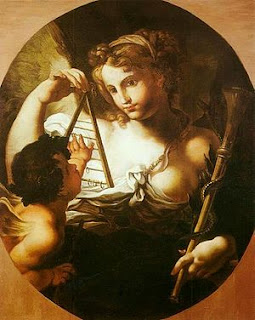 |
| Allegory of Science, by Sebastiano Conca |
There are
different kinds of sciences. Some are rigorous and have great predictive power,
others less, others practically none. Let us look at a classification of the
sciences:
·
Formal sciences: They
start from axioms or postulates, more or less unassailable, and use deduction as the main method of
reasoning. A few play the role of fundamental basis for other sciences. In this
group, we can include mathematics, logic and theoretical computer science.
·
Natural sciences: They
use induction as the main
method of reasoning. Their objective is to discover fundamental laws that explain the working of the world. They
rely more or less on logic and mathematics. These sciences include (in order of
decreasing rigor) physics and astronomy; chemistry; biology, geology and
paleontology.
·
Social Sciences: They
use abduction as the main
method of reasoning (see an
earlier article in this blog). Their object of study is man or society.
These sciences include psychology, economics, sociology, anthropology,
politics, archeology and history.
·
Finally, the applied sciences, whose objective is to
develop practical applications from the theoretical knowledge provided by the
experimental and social sciences. They usually associate under the name of technology, although there are
some disciplines that fall outside that umbrella, such as legal sciences,
applied economics, medicine, or applied psychology.
History
is one of the disciplines most distant from formal sciences. The nearest to a
mathematical study of history are historical statistics, which provide data on
the evolution of quantifiable variables over time. A book I have written but not
published (The
quantification of history and the future of the West) is a further
attempt in this direction.
In
science fiction, the use of mathematical methods in history has sometimes been
touched upon. Thus, in the initial trilogy of the Foundation, Isaac Asimov
invented the term psychohistory
to refer to a science, a mixture of mathematics, history and sociology, which
would be able to make reliable predictions about the future of societies. While
explaining how psychohistory would work, Asimov recognizes that the behavior of
individual human beings is not predictable, but asserts that the behavior of
large social masses (countries, planetary societies or galactic empires) is usually
predictable. To illustrate his claims, Asimov unbalances and alters the history
of the Foundation, as predicted by Seldon (the founder of psychohistory), by the
emergence of a unique and unpredictable personality (the Mule) in the second
part of the second volume, for me the best of the trilogy.
In
addition to science fiction, there are two other genres of novel closely
related to history:
·
Historical novel: within
the framework of real historical events, fictitious characters are introduced
and historical data (always full of gaps) are completed with others provided by
the author’s imagination. My favorite example of this genre is War and Peace,
by Leo Tolstoy. As shown by this example, a historical novel can be perfectly
true to what actually happened (in this case, the invasion of Russia by
Napoleon, along with its historical background), while being an excellent
novel.
·
Uchrony or alternate
history poses the following situation: what would
have happened if such historical event had not taken place, or had taken place in
another way? This literary genre does not, in fact, have
anything to do with serious history and must be considered purely imaginative, as
it is based on what in logic is called a counterfactual, an event that has not
occurred, but could have happened, and so is part of a possible universe.
Unfortunately,
history as a discipline makes frequent use of counterfactuals, which should
only be used in creative literature. If this happens, what should be a serious
historical study becomes an exercise in literary uchrony. Let us look at an
example:
 |
| Expulsions of Jews in Europe |
The expulsion of the Jews from Spain in 1492 by order
of the Catholic Monarchs has often been presented as a far cause of the decline
of the Spanish Empire. Although this theory is discredited among today’s serious
historians, there was a time when everyone took it for granted, even though it
is an exercise in alternative history: “what would have happened if the Jews
had not been expelled from Spain?” Even now, many non-professionals are still
convinced of its truth.
It is
curious that this theory seems to have been raised only in relation to Spain,
never in relation to other countries that also carried out mass expulsions of
Jews. Let us look at a few (data from Wikipedia):
Country
|
Expulsion
|
Al-Ándalus, Almohad Caliphate
|
Practice of Judaism forbidden
|
France
|
1182, 1306, 1321, 1394
|
England
|
Total expulsion between 1290 and 1753
|
German states
|
1348, 1510, 1551
|
Hungary
|
1349, 1360
|
Austria
|
1421
|
Lituania
|
1445, 1495
|
Spain
|
1492
|
Portugal
|
1496
|
Potifical States
|
1569/1593
|
As far as
I know, no pseudo-historical alternative histories have been built on any of
the expulsions, except for Spain. It would be interesting to consider why.
The
problem, in my view, is that history is a discipline far removed from science
and too influenced by ideological tendencies. Many historians, among them famous
figures from all times, did not really make history, but just tried to justify
their own ideology.
The same post in Spanish
Thematic Thread on Science and History: Previous Next
Manuel Alfonseca

No comments:
Post a Comment